Discover the best project management tools for remote teams, boosting productivity and collaboration, all tailored for seamless virtual workflows.
Sure! Here’s the first 700 words for the blog post on “Top Project Management Software for Remote Teams.” I’ll keep the language simple and sentences short.
Remote work is becoming more common. Teams work from different locations, even different countries. This creates challenges, especially in managing projects. But, with the right project management software, teams can stay connected and efficient.
This guide will cover some of the best project management software for remote teams. We will look at tools that help with communication, task tracking, time management, and more.
Let’s dive in!
1. Trello

Trello is a popular project management tool. It uses a “board” and “card” system. Each board is a project. Each card is a task. This setup is easy to understand.
Why Trello?
- Visual: Trello shows tasks in a clear way. You can see what needs to be done.
- Easy to Use: No need for training. Most people understand it quickly.
- Flexible: You can use Trello for different types of projects.
Features of Trello
- Kanban Boards: This is a visual way to manage tasks. Move cards from “To-Do” to “In Progress” to “Done.”
- Due Dates: Set deadlines for each task.
- Labels and Tags: Use colors and labels to organize tasks.
Best for
- Small teams
- Simple projects
2. Asana

Asana is a strong project management tool. It offers many features for remote teams. Asana is very organized and helps you keep track of everything.
Why Asana?
- Multiple Views: See tasks as a list, board, or calendar.
- Task Assignments: You can assign tasks to team members.
- Easy Tracking: Keep track of task progress in real-time.
Features of Asana
- Task Dependencies: Some tasks need others to be finished first. Asana shows which tasks depend on each other.
- Project Templates: Start projects faster with templates.
- Goal Tracking: Set project goals and measure progress.
Best for
- Medium to large teams
- Teams with complex projects
3. Slack

Slack is more than a chat app. It’s a communication tool that keeps teams connected. Many remote teams use Slack to share updates and ask questions.
Why Slack?
- Instant Communication: Chat with team members in real time.
- Channels: Separate conversations into topics.
- Integrations: Connect Slack with other apps like Google Drive, Asana, and Trello.
Features of Slack
- Direct Messaging: Send private messages.
- File Sharing: Share files and documents easily.
- Video Calls: Talk face-to-face with team members.
Best for
- Teams that need quick communication
- Any size team
4. ClickUp

ClickUp is a powerful project management tool. It has many features and customization options. ClickUp aims to be an “all-in-one” tool.
Why ClickUp?
- Highly Customizable: Change views, add fields, and create custom dashboards.
- Wide Range of Features: From time tracking to goal setting, ClickUp has it all.
- Affordable: ClickUp offers many features even in the free version.
Features of ClickUp
- Multiple Views: See tasks as a list, board, or calendar.
- Time Tracking: Track how much time you spend on tasks.
- Goals and Targets: Set goals for the team to reach.
Best for
- Teams of all sizes
- Teams that need many features in one place
Choosing the Right Software
Every team is different. Some tools are simple, while others are complex. Here are some factors to consider:
- Team Size: Small teams might prefer simple tools like Trello. Larger teams may need tools like ClickUp or Asana.
- Budget: Some tools are free. Others have paid plans. Choose one that fits your budget.
- Project Type: Simple projects need simple tools. Complex projects need more advanced tools.
- Features Needed: Not every team needs every feature. List the features that matter most to your team.
Choosing the right project management software can improve teamwork and efficiency. It helps remote teams stay on track and complete projects successfully.
5. Monday.com
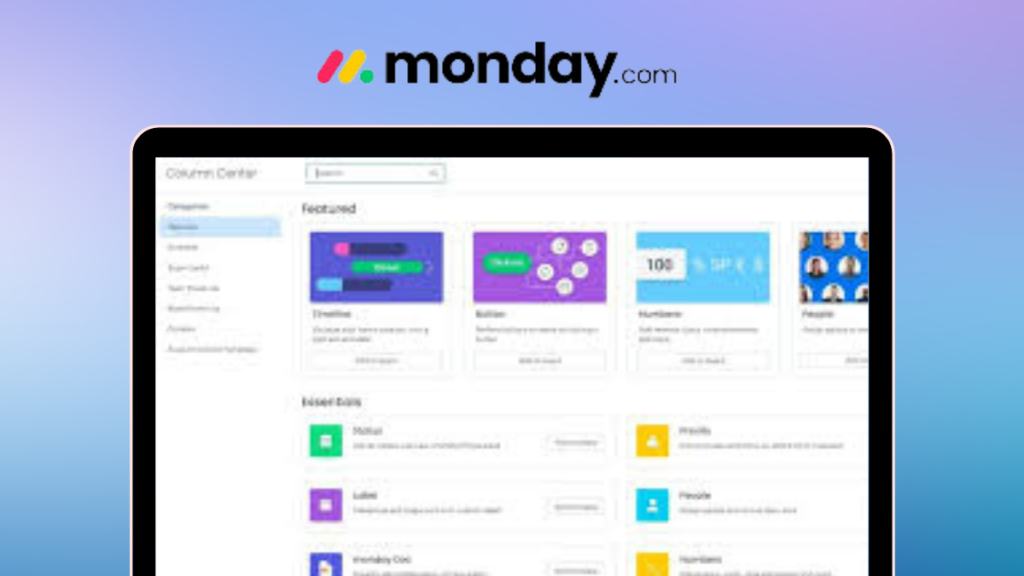
Monday.com is a versatile project management tool. It’s known for its user-friendly design and strong collaboration features. Teams can manage tasks, share updates, and track progress in real-time.
Why Monday.com?
- Easy to Customize: Create a project workflow that fits your team’s needs.
- Multiple Views: View tasks as a list, timeline, or calendar.
- Automations: Automate repetitive tasks, saving time and reducing errors.
Features of Monday.com
- Progress Tracking: See how much of a project is done at a glance.
- Automated Reminders: Set up alerts for deadlines and important tasks.
- Integrations: Connect with other apps like Google Calendar, Slack, and Zoom.
Best for
- Teams looking for customization options
- Teams that handle complex projects
6. Basecamp
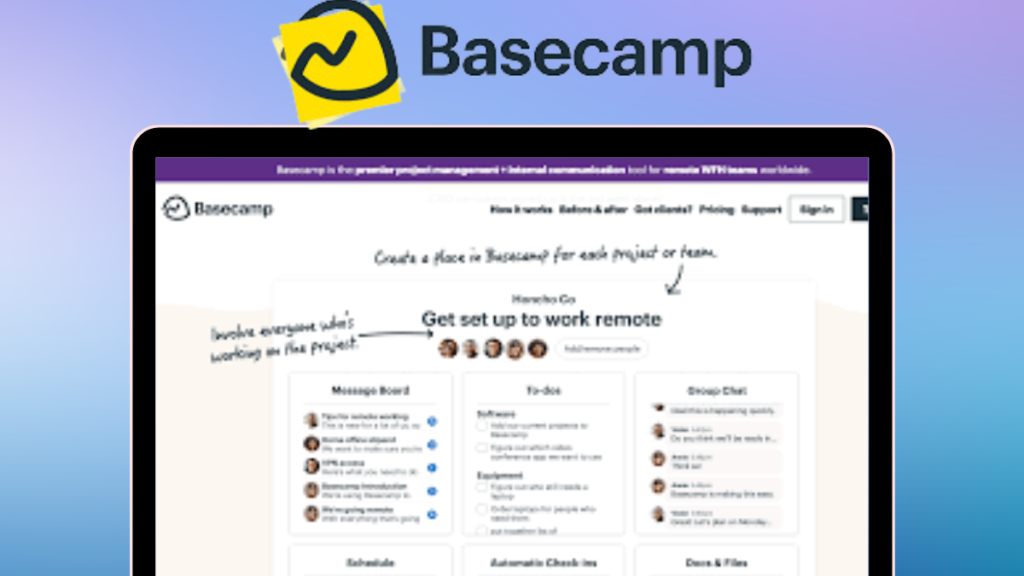
Basecamp is popular with remote teams, especially in creative fields. It combines project management with team communication. Basecamp keeps all project information in one place.
Why Basecamp?
- Simple Layout: Easy to navigate, even for beginners.
- Clear Communication: Centralize discussions to avoid email chains.
- Affordable: One flat fee, suitable for small and medium-sized teams.
Features of Basecamp
- To-Do Lists: Organize tasks and mark them complete.
- Message Boards: Discuss project updates and share feedback.
- Project Templates: Quickly set up new projects with templates.
Best for
- Teams that prefer simplicity
- Creative teams
7. Microsoft Teams

Microsoft Teams is well-suited for remote work. While it’s mainly a communication tool, Teams also offers project management features. It’s great for companies that already use Microsoft 365.
Why Microsoft Teams?
- Integrates with Microsoft Tools: Teams works well with apps like Word, Excel, and Outlook.
- Good for Large Teams: Handles big group calls and meetings.
- File Sharing and Collaboration: Teams can edit documents together.
Features of Microsoft Teams
- Channels: Separate discussions into different topics.
- Task Management: Use Microsoft Planner for task tracking.
- Meetings and Video Calls: Host virtual meetings with screen sharing.
Best for
- Teams already using Microsoft products
- Large companies
8. Jira
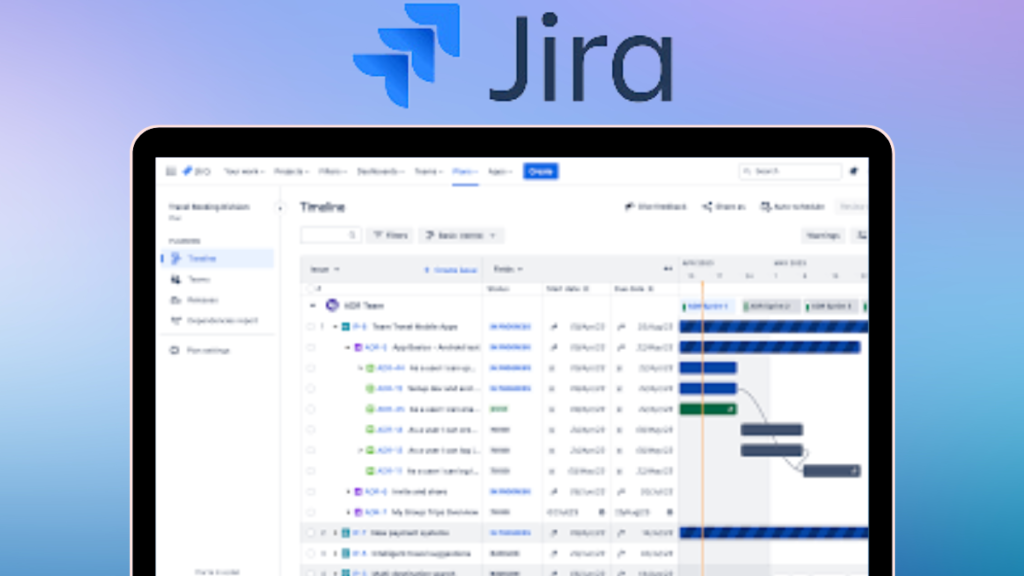
Jira is a tool made for software development teams. It helps with planning, tracking, and releasing software projects. Many remote software teams use Jira.
Why Jira?
- Focused on Development: Jira is designed for tech teams.
- Agile Project Management: It supports agile methods like Scrum and Kanban.
- Issue Tracking: Track and manage bugs and issues.
Features of Jira
- Backlogs: Organize tasks in a backlog for future sprints.
- Custom Workflows: Set up workflows for each project.
- Reports and Analytics: Get detailed insights into project progress.
Best for
- Software development teams
- Teams using agile methods
9. Notion
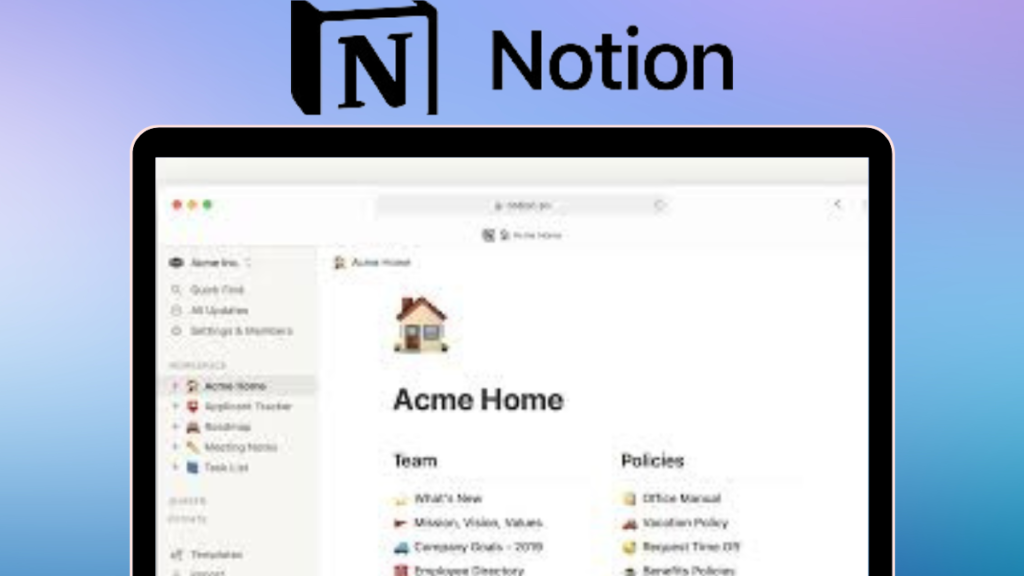
Notion is more than a project management tool. It’s a workspace where teams can create documents, plan projects, and store information. Many remote teams use Notion for note-taking and project tracking.
Why Notion?
- Flexible Workspace: Customize it to fit any type of project.
- Collaboration: Team members can edit documents together.
- Organized: Keep all project files, notes, and tasks in one place.
Features of Notion
- Database and Table Views: Organize data in lists, tables, or calendars.
- Template Library: Use templates to start projects faster.
- Notes and Docs: Create documents and keep notes in one tool.
Best for
- Teams looking for an all-in-one workspace
- Small to medium teams
Tips for Using Project Management Tools Effectively
Project management tools can make a big difference for remote teams. But, to get the most out of these tools, follow these tips:
- Train Your Team: Make sure everyone knows how to use the tool. This saves time and reduces confusion.
- Set Clear Goals: Define what success looks like. Clear goals help the team stay focused.
- Communicate Regularly: Use the tool to share updates. Regular communication keeps everyone in the loop.
- Track Progress: Use the tool’s tracking features to monitor tasks. This helps you catch issues early.
- Avoid Overloading: Too many tools can be confusing. Choose one or two that meet your needs.
Choosing the right project management software and using it well can improve teamwork, reduce mistakes, and make remote work easier.
10. Wrike
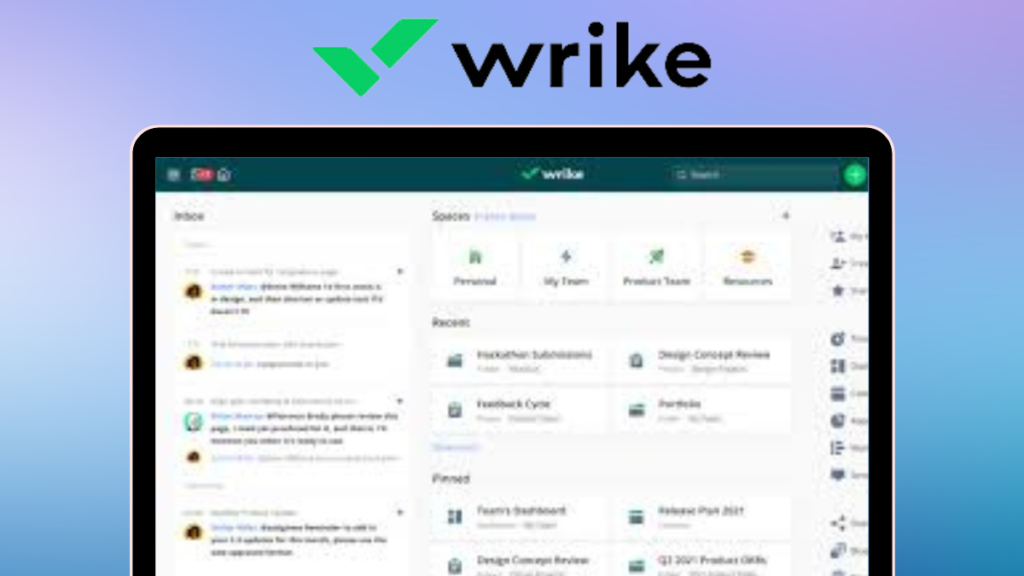
Wrike is a powerful project management tool. It’s designed for teams that need advanced project tracking and reporting. Wrike offers many features that are useful for remote teams, such as time tracking and workload management.
Why Wrike?
- Detailed Reporting: Wrike provides in-depth reports to track project progress.
- Customizable Dashboards: Set up dashboards to see tasks and deadlines.
- Real-Time Collaboration: Teams can work together in real-time, even remotely.
Features of Wrike
- Gantt Charts: Visualize project timelines and see task dependencies.
- Time Tracking: Track how much time is spent on tasks.
- Request Forms: Collect task requests and organize them.
Best for
- Teams with complex projects
- Teams that need advanced reporting
11. Zoho Projects
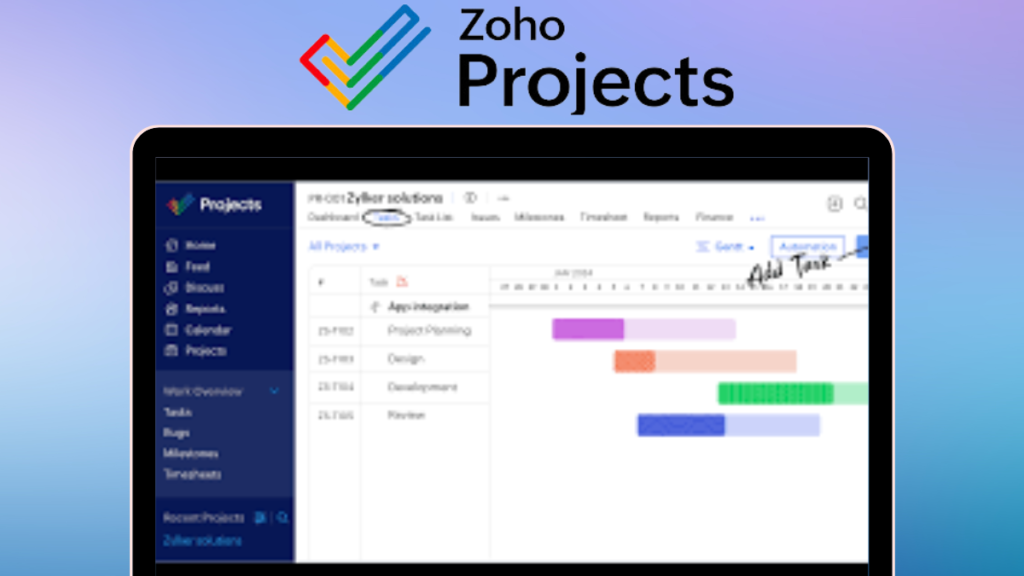
Zoho Projects is part of the Zoho suite, which includes various business tools. It’s a user-friendly project management software that works well for small to medium-sized remote teams.
Why Zoho Projects?
- Affordable: Zoho Projects offers affordable pricing for small businesses.
- Integrates with Other Zoho Apps: Connects easily with Zoho’s other tools like CRM and analytics.
- Customizable: Allows you to customize workflows and dashboards.
Features of Zoho Projects
- Task Management: Organize tasks with milestones and dependencies.
- Time Tracking: Track hours spent on each task.
- Collaboration Tools: Use forums, chats, and feeds to stay connected.
Best for
- Small to medium-sized teams
- Teams using other Zoho products
12. Teamwork
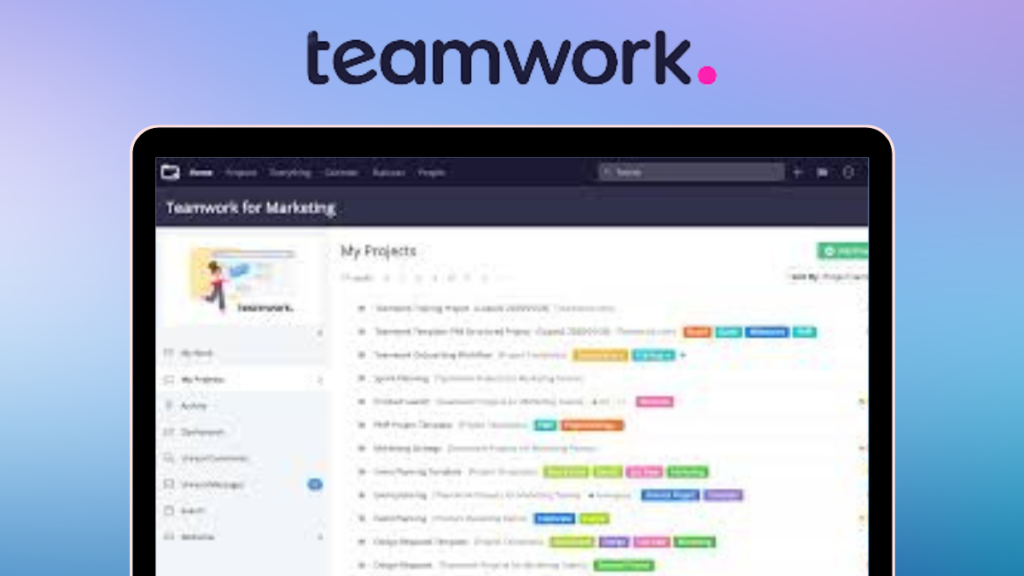
Teamwork is a project management tool specifically designed for client work. It’s popular with remote agencies and service-based businesses. Teamwork offers features for managing tasks, tracking time, and billing clients.
Why Teamwork?
- Client Management: Easily manage client projects and keep track of feedback.
- Time Tracking and Billing: Track billable hours and generate invoices.
- Project Templates: Set up new projects quickly with reusable templates.
Features of Teamwork
- Task Lists: Organize tasks into lists for easy tracking.
- Project Milestones: Set milestones to measure progress.
- File Storage: Store project files in one place for easy access.
Best for
- Remote agencies
- Teams working on client projects
Comparing Top Project Management Tools
Choosing the right tool depends on your team’s needs. Here’s a quick comparison of some key features:
| Software | Best For | Key Features | Price Range |
|---|---|---|---|
| Trello | Small teams | Kanban boards, labels | Free, Paid plans |
| Asana | Medium to large teams | Task dependencies, templates | Free, Paid plans |
| Slack | Communication | Channels, integrations | Free, Paid plans |
| ClickUp | All-in-one solution | Time tracking, custom views | Free, Paid plans |
| Monday.com | Customizable projects | Automations, progress tracking | Paid plans only |
| Basecamp | Simple projects | To-do lists, message boards | Flat fee |
| Microsoft Teams | Large teams | Channels, task management | Free, Paid plans |
| Jira | Software development | Backlogs, issue tracking | Paid plans only |
| Notion | All-in-one workspace | Notes, databases, templates | Free, Paid plans |
| Wrike | Complex projects | Gantt charts, detailed reports | Free, Paid plans |
| Zoho Projects | Small businesses | Task management, time tracking | Free, Paid plans |
| Teamwork | Client projects | Time tracking, billing | Paid plans only |
Final Thoughts
Project management software is essential for remote teams. The right tool keeps everyone connected, on track, and productive.
Here are some tips to choose the right tool for your team:
- Understand Your Needs: What type of projects do you manage? Simple tasks or complex workflows?
- Consider Team Size: Large teams may need advanced tools. Small teams might prefer simple tools.
- Try Free Trials: Most tools offer free trials. Test a few to see which one fits best.
- Check Integrations: Make sure the tool connects with apps your team already uses.
Using project management software can make remote work smoother and more successful. With the right tool, remote teams can achieve great results and work efficiently, no matter where they are.











